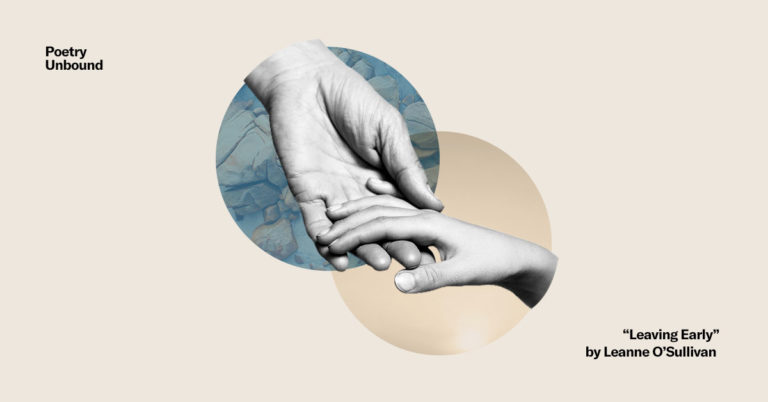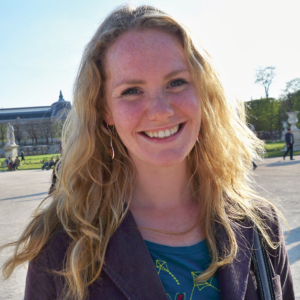Leanne O'Sullivan
Leaving Early
In Leanne O’Sullivan’s poem “Leaving Early,” the poet writes to her ill husband, entrusting him into the care of a nurse named Fionnuala. As the novel coronavirus sweeps the globe, many of us can’t physically be there for loved ones who are sick. Instead, it is the health care workers — and all involved in the health care system — who are tirelessly present, caring for others in spite of exhaustion and the risk it brings to their own wellbeing.
We offer this episode of Poetry Unbound in profound gratitude toward all who are working in health care right now.

© All Rights Reserved.
Guest

Leanne O'Sullivan was born in 1983 and comes from the Beara peninsula in Ireland's West Cork. The winner of several of Ireland's poetry competitions in her early 20s, she has published four collections of poetry, including, most recently, The Mining Road and A Quarter of an Hour. She teaches at University College, Cork.
Transcript
Pádraig Ó Tuama, host: My name is Pádraig Ó Tuama, and I have asthma. And these days, I’m very aware of my breathing and any possible compromise of my breathing and ways within which, as a person with pretty chronic asthma, I need to be very attentive to my own lungs. That’s a small item for me. I think of other people who have so many more reasons to be anxious about their own health, anxious about their own exposure.
And poetry, for me, poetry is a thing that helps me breathe. There’s space on the page for my own imagination to fill in the bits that I need, and poetry makes me slow down in my reading. I never skim-read a poem. I read it out loud to myself, and it slows my heart down; it slows my breathing down, and it helps my lungs to fill.
“Leaving Early” by Leanne O’Sullivan:
“My Love,
tonight Fionnuala is your nurse.
You’ll hear her voice sing-song around the ward
lifting a wing at the shore of your darkness.
I heard that, in another life, she too journeyed
through a storm, a kind of curse, with the ocean
rising darkly around her, fierce with cold,
and no resting place, only the frozen
rocks that tore her feet, the light on her shoulders.
And no cure there but to wait it out.
If, while I’m gone, your fever comes down —
if the small, salt-laden shapes of her song
appear to you as a first glimmer of earth-light,
follow the sweet, hopeful voice of that landing.
She will keep you safe beneath her wing.”
I encountered this poem because I was looking for some poems that would be appropriate for thinking about the crisis of Covid-19 that’s global and pandemic right now. I think of the nurse in the poem, Fionnuala — I think of all the healthcare workers, nurses, doctors, administrators, people working in hospitals and healthcare centers, and ambulances, and I wonder about all of their names and wonder, do people notice their names? And how, in the midst of this crisis, can we notice the names of people?
Then I saw that terribly sad line: “And no cure there but to wait it out” — so appropriate for now, I think. In the middle of a crisis, people want to have the kind of perspective that years, and maybe five years in the future, will give for an analysis of where we are right now, but we don’t have that, and there is only a cure now but to wait it out until there is a cure. And the line, too, in the poem, about a fever coming down: So much of Covid-19 is about people monitoring their temperature and wondering will their fever spike; can they wait this out at home; will they need to be in hospital? Who will look after them there; will they be able to have a visitor? As of the moment, all hospitals in Ireland, North and South, are not allowing visitors in, in order to protect everybody who’s in there, the workers as well as the patients. So this poem, while it’s written in an entirely different circumstance, has so many echoes for now.
This poem, I think, is a profoundly hospitable poem, and a poem with all kinds of depths. On the first reading of it, you understand immediately that somebody’s being written to. It’s written like a sonnet that starts off as a letter: “My love.” And clearly, somebody is leaving early; that’s the title. And they’re entrusting somebody they love to the care of a nurse named Fionnuala. And so you don’t need to have any background, and you can feel like you’re in the poem, and you feel the intensity and the deep trust that the writer, the poet, Leanne O’Sullivan, is imparting into this nurse named Fionnuala.
And then there’s another layer to the poem, which you get when you read the book. The book, called A Quarter of an Hour, starts off with a little paragraph, saying that Leanne O’Sullivan, the poet, her husband had a brain infection which rendered him into a coma for three weeks. And so, when you know that from the start of the book, there’s this reference to her wing. And you think of this nurse, showing up in his unconscious and in his dream world of recovery like a bird, guiding him home. And that’s so hospitable and so beautiful.
And then there’s the third level to this poem, also, which probably is very Irish, in the sense of the name, Fionnuala. The main character in Irish mythology, named Fionnuala, was the oldest of four siblings who were cursed to spend 900 years as swans in various stormy lakes all around Ireland. And Fionnuala, the oldest sibling, was the one who negotiated a pathway out of that curse, through magic. She is someone who weathered storms for 900 years in the shape of a swan with these huge wings. And in the poem, you hear of Fionnuala as the nurse with wings who has weathered her own storm. And so this poem works on an immediate reading, but it also calls to mind deep mythologies.
And then you also think of, who is this nurse? Who is this nurse, whose name was Fionnuala, in this hospital where the poet’s husband was in such a terrible state of ill health? And the kindness and hospitality toward that nurse — to imagine that that nurse, too, had her own troubles, had her own woes, just like healthcare workers the world over at the moment; they are caring for people in hospitals, and, at the same time, they have their own concerns — families back home; friends back home; their own state of being. There’s so much hospitality in this poem, of deep consideration for the person of the nurse, the person of the healthcare worker. I think, too, of the person of the ambulance driver, or the administrator, the person looking after the lists and trying to figure out what order people are seen in.
I think this poem shows various shapes of love. The nurse Fionnuala is demonstrating extraordinary love, too. The letter speaks about Fionnuala: “You’ll hear her voice sing-song around the ward / lifting a wing at the shore of your darkness,” and just even in speaking of the music of the voice of the people who are in the ward with you as a consolation, as a balm, and that a person might hear it in the midst of a fever or in the midst of their own illness — that’s a profound form of love. It isn’t just the skill that they have, nurses and doctors and healthcare workers and ambulance workers and paramedics for diagnosis. It’s also the presence of being there with a voice: to speak, to listen, to observe, to watch, and that their voice is a kind of calling home and a soothing. And the poet, Leanne O’Sullivan, is entrusting someone she loves to the voice of a nurse who she doesn’t know, but she does know, too, because of this deep, loving, and trusting gaze that she has put towards this nurse.
I’ve got a friend who works in the healthcare system who was telling me that they’re washing their hands in the hospital with floor cleaner, because people had come in and taken some hand sanitizer. And so, obviously, all workers in hospitals are washing their hands constantly, and the only thing available was floor cleaner. They sent me a picture of their hands, chapped and awkward. And they were saying that their boss has begun saying to the team of people in the hospital that “I love you,” at the end of their shifts, because it’s important. And love has come into the workplace in a really serious way in these days. Ways in which people who are doing an almost impossible job with graciousness, with fortitude, and with perseverance and patience are being shored up by the love of each other, is a really beautiful thing.
And I think, for people who are working at the moment in healthcare and providing tireless, patient, strong care to people in extraordinarily anxious times, this poem is saying, “You are trustable.” And it’s inviting a person to think, “What might it be like to imagine that I’m trustable by people who are in deep anxiety?” And I think to carry that is a really important thing. And I would hope that anybody that I know and anybody who’s listening, who is showing care and welcoming people into a hospital, doing the administration, driving the ambulance, doing the initial analysis in an ambulance — all of these many, many jobs that make up a healthcare system — my hope is that a person would know that their life and their story is being wrapped into a story of care and that they, too, deserve the same care that they’re giving.
“Leaving Early” by Leanne O’Sullivan:
“My Love,
tonight Fionnuala is your nurse.
You’ll hear her voice sing-song around the ward
lifting a wing at the shore of your darkness.
I heard that, in another life, she too journeyed
through a storm, a kind of curse, with the ocean
rising darkly around her, fierce with cold,
and no resting place, only the frozen
rocks that tore her feet, the light on her shoulders.
And no cure there but to wait it out.
If, while I’m gone, your fever comes down —
if the small, salt-laden shapes of her song
appear to you as a first glimmer of earth-light,
follow the sweet, hopeful voice of that landing.
She will keep you safe beneath her wing.”
Lily Percy: “Leaving Early” comes from Leanne O’Sullivan’s book A Quarter of an Hour. Thank you to the publisher, Bloodaxe Books, who gave us permission to use Leanne’s poem. Read it on our website, at onbeing.org.
Poetry Unbound is Tony Liu, Chris Heagle, Kristin Lin, Erin Colasacco, Serri Graslie, Eddie Gonzalez, Julie Siple, and me, Lily Percy. Our music is composed and provided by Gautam Srikishan.
This podcast is produced by On Being Studios, which is located on Dakota land. We also produce other podcasts you might enjoy, like On Being with Krista Tippett, Becoming Wise, and This Movie Changed Me. Find those wherever you like to listen, or visit us at onbeing.org to find out more.




